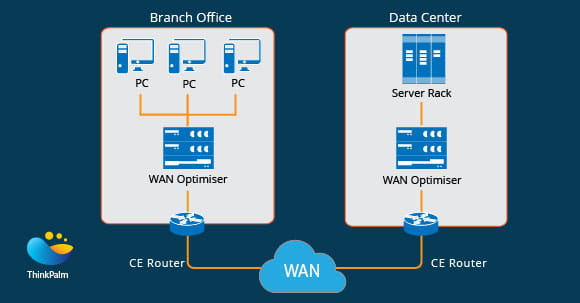WAN optimization is one of the fastest growing technologies in today’s tech world. It is a combination of techniques to increase the data transfer efficiency and to save bandwidth. According to Gartner, the WAN optimization market grew from $1 billion in 2008 to 4.4 billion in 2014. Let’s take a look at how it came into existence.
The Economic liberalization that happened across the world in the last quarter of the 20th century resulted in the growth of multinational companies. MNCs established their offices across the world. Every branch office needed to contact its head office located in a different geographical area. These branch offices were required to send a lot of data to their headquarters. Due to security issues, most companies used leased lines, the costs of which were very high. Soon companies started looking for a way to reduce WAN bandwidth without compromising efficiency. This resulted in the invention of WAN optimization. Using the various optimization techniques, the WAN optimization not only reduces bandwidth and saves cost, but also increases the speed of data transfer!
During the initial days of WAN optimization, it was just a caching machine and acted like a proxy device. A WAN optimization device would be present in the branch office network; a redirection protocol would be running in the network router and in the WAN optimization device. All the traffic coming from the branch office will be redirected towards the caching machine. The cache machine will check whether the requested content is available in its cache. If it is present, then the cache engine will reply to client with its cached data. If the requested content is not available, then the cache engine will send the request back to branch router and subsequently branch router will send it to the server. When the server replies with data, the branch router will again redirect it to cache engine and the cache engine stores that data and delivers it to client . In this way, subsequent requests to the same content can be served by the cache engine itself.
The cache machine had many disadvantages. It was not able to perform TCP acceleration and provide data compression. Both TCP acceleration and data compression save substantial bandwidth. The next generation of WAN optimization came by using these two features. It is a dual sided solution in which there will be one WAN optimization device in the branch office side and one in the datacenter side. It uses the redirection protocol on both branch and datacenter routers and redirects to the WAN optimization device in that location. WAN optimization devices provides two types of optimization:

TCP acceleration is usually done by providing large TCP window size. The traffic specific optimization is done by providing selective acknowledgements by the WAN optimization device to client and server. The WAN optimization device does the acknowledgement as if it is the destination device. So the time and bandwidth required to send data to destination device will be saved. The sync up between the optimization devices in the branch and datacenter sides avoids the transfer of redundant data. Compression of data will be performed by branch side device and decompression by the device in datacenter. The redundant data transfer elimination and data compression save bandwidth to a great extend. Using WAN optimization, traffic like Web, Video, Outlook, File sharing and so on can be optimized.
WAN optimization market has grown substantially in the last decade. The main players in this area are Riverbed, Cisco, Citrix, Bluecoat and Siverpeak. With the development of SD-WAN, these companies are deploying their WAN optimization solutions in the cloud. The market share of WAN optimization in the year 2015 is as follows with Riverbed emerging as the market leader! With the technology gaining significant traction, the stupendous growth is expected to continue in the years to come.